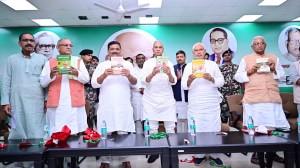Foreign Minister of Romania, Luminita Odobescu, who participated in the Raisina Dialogue last week, speaks to Shubhajit Roy on a range of issues including strengthening bilateral ties in energy, defence and IT, and Russia’s war on Ukraine. Edited excerpts:

India is an essential partner for Romania in the South Asia region, both bilaterally, as well as within the framework of the EU-India Strategic Partnership. 2023 was a special year in the history of our ties. We marked 75 years since the establishment of our diplomatic relations and 10 years of the Extensive Partnership.We have achieved great progress together during all these years and there is genuine and mutual interest to deepen our cooperation.
Story continues below this ad
Together with (External Affairs) minister (S) Jaishankar, we adopted a Celebratory Joint Declaration last Friday (February 23), following the 10th Anniversary of the Extensive Partnership between Romania and India, considering the current complex international context and focusing the cooperation in key areas of energy, IT&C, and manufacturing.
Further, in the field of trade, we made excellent progress: for the first 11 months of 2023 the bilateral exchanges reached $1.6 billion, making India Romania’s second largest trading partner in the Asia-Pacific region.
Beyond the essential aspect of bilateral cooperation, India plays a vital role in the current geopolitical equation, not only within the Indo-Pacific area, but globally. And we are committed to working together for defending the international order based on the rule of law, with the UN at its core.
Which are the sectors where Romania and India can work together?
Story continues below this ad
Romania’s and India’s work together should focus on a set of common goals: Firstly, we need to take advantage of both countries’ multiple investment opportunities. In recent times, Indian companies have shown big interest for new investments in Romania in sectors such as: defence, industry, agriculture, food and wine industries.
Romanian companies have technical and innovative capabilities to participate in development projects in India — in conventional energy, renewable energy, oil and gas, infrastructure, metallurgy, mining, railways, defence, etc. We can also participate in different programmes by transferring technology, delivering products, and providing know-how.
Secondly, we need to promote enhanced bilateral economic cooperation on Energy, Information Technology and Communication (IT&C) and Manufacturing Industry.
Thirdly, India is a major trade and investment partner for the EU. There are ongoing negotiations for a balanced, ambitious, comprehensive and mutually beneficial EU – India trade agreement, as well as for an investment protection agreement. These open the door for a new era, creating potential for increased trade and investment flows between our nations, promoting innovation and employment, and a level playing field for European and Indian businesses.
Story continues below this ad
The EU-India negotiations are definitely sending an important signal to the world in support of the rules-based trade system.
What is the roadmap for peace in Europe? Are there any chances for all parties to come to a solution?
Instead of talking about a war in Europe, we should describe it as what it really is — Russia’s illegal and unprovoked war of aggression… So, the conflict could end tomorrow if Russia decides to stop its aggression and to respect Ukraine’s sovereignty and territorial integrity…
How can we expand the role of women in leadership at the global level?
Story continues below this ad
…there is no quick fix or one-size-fits-all solution to expand female leadership globally. It requires women’s involvement and empowerment, communication to dismantle gender stereotypes, as well as the understanding that inclusive foreign policy is in everybody’s interest, including at a wider organisational level. full interview









